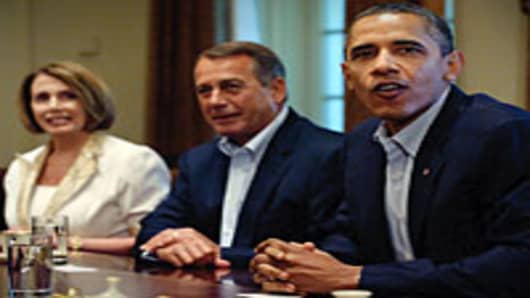Last week brought the disconcerting news that the economy grew no faster than the population during the first six months of the year, in part because of spending cuts by state and local governments. Now the federal government is cutting, too.
“Unemployment will be higher than it would have been otherwise,” Mohamed El-Erian, chief executive of the bond investment firm Pimco, said Sunday on ABC. “Growth will be lower than it would be otherwise. And inequality will be worse than it would be otherwise.”
He added, “We have a very weak economy, so withdrawing more spending at this stage will make it even weaker.”
The agreement would end months of single-minded debate about the federal debt that has diverted Washington’s attention from broader economic questions, and indeed threatened the health of financial markets as investors watched and wondered whether the United States might really decide, quite voluntarily, to leave some bills unpaid.
If both chambers of Congress give their approval by Tuesday night, the government will have averted the danger of a self-inflicted financial crisis, but only at the expense of public confidence in its ability to address the nation’s broader economic malaise.
The looming challenges include a renewal of the standoff over the federal budget at the end of September, and the scheduled expiration at the end of 2012 of the broad tax cuts passed during the administration of President George W. Bush.
President Obama said Sunday night that the deal “begins to lift the cloud of debt and the cloud of uncertainty that hangs over the economy.” He added that political leaders now “should be devoting all of our time” to the nation’s broader economic challenges.
But economists say the deal could complicate that task. There is broad agreement that the United States needs to pay down its debts, but most economists say the government should have waited a year or more for the economy to strengthen.
“We sure missed a big window of opportunity to reduce our debt in those strong years when asset prices were booming,” said Carmen Reinhart, senior fellow at the Peterson Institute for International Economics and co-author of “This Time Is Different,” a history of debt crises. “Instead we’re stuck trying to do it now, when the economy is so weak.”
The economy grew at an annual rate of only 0.8 percent during the first half of the year. Millions of homes remain empty. Twenty-five million Americans could not find full-time jobs last month. And even without the debt ceiling deal, federal spending is in rapid decline. Little remains of the federal stimulus money. Payroll tax cuts are set to expire at the end of the year.
The combination of the budget-cutting government’s plans and the grim economic news is likely to increase pressure on the Federal Reserve, which will hold a scheduled meeting on Aug. 9, to reconsider its declaration earlier this summer that it has done enough to aid the economic recovery.
After four years of extraordinary efforts to promote growth, including a continuing campaign to hold down interest rates for at least a few more months, officials at the central bank say they are reluctant to do more. But the Fed’s chairman, Ben S. Bernanke, said if the economy deteriorates and there is a growing risk of deflation or a broad decline in prices, policy makers could act.
The Fed’s options include pledging to maintain low interest rates for a specified period of time or increasing its holding of government debt in a bid to further reduce rates.
“It’s difficult to find a textbook to tell you what should you do now,” said Torsten Slok, chief international economist at Deutsche Bank.
The Republican authors of the debt ceiling deal say that cutting the size of government will increase economic growth down the road because federal borrowing soaks up money otherwise available to private businesses and federal spending distributes that money inefficiently.
Some conservative economists argue that even the immediate impact of a deal could be positive. Classic economic theory holds that people respond to the growth of government by spending less of their own money, because they assume that taxes will increase. A reduction in the federal debt therefore should encourage people to spend more of their money.


